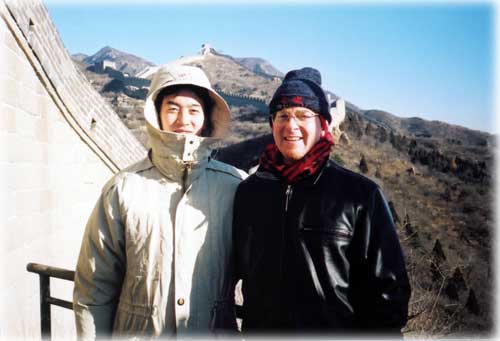 by Preston MacDougall July 24, 2005
People, and I think that includes all of us, can't seem to get enough news. Twenty-five years ago, Ted Turner realized that this was quite literally true, and CNN was born. Paradoxically, change is seldom courted. In fact, our reluctance to accept inevitable change can be downright childish. How else can you explain the fear struck in the hearts of Americans by the consecutive use of the two words "metric" and "system"?  Really now, when a lab-on-a-chip can have an engine the size of a grain of sand, do we really want to measure power in units of horses? I like horses as much as the next chemist, but I suspect that the key developer of the steam engine, Scots thermodynamicist James Watt, would urge us to move on. It is both convenient and sensible to use units of measurement that can quantify the microwatt power output of a barely visible electrochemical fuel cell, or the gigawatt output of a nuclear power plant. I suspect that we tend to put off change because most of the time we aren't given a choice. Rare but unpreventable tsunamis and earthquakes unfortunately have the power to change shorelines and skylines, respectively. Sometimes, however, Nature dishes up powerful changes that are pure delight. I am thinking of the Chinook winds in western Canada. Imagine the awesome thermal power needed to blow-dry a snowbound city like Calgary, Alberta. When the Chinook winds swoop down from the Rockies, the weather can turn from parkas and mukluks, to tank-tops and flip-flops in a few hours. The hypothesized cause of global warming during the ongoing industrial age is the measurable, and rising, atmospheric level of carbon dioxide from the world-wide combustion of fossil fuels. As the world's two most populous countries, India and China, rev-up their economic engines, the Kyoto treaty will prove to be a paper barrier to a surging atmospheric concentration of carbon dioxide. This is a chemical problem, it requires a chemical solution. As the tribal name implies, the Chinook winds predate industry. Even so, it is still a greenhouse gas that provides their incredible heating power - water vapor. That's right, plain old water is also a greenhouse gas. Water is produced along with CO2 during the combustion of hydrocarbons, but since we live in a watery world, the man-made contribution to the atmospheric level of water vapor is negligible. Although water is a greenhouse gas, the greenhouse effect doesn't have the power to thaw a city in hours. The thermodynamics of the Chinook works just as well in the dark. That's because Chinook winds have more in common with James Watt's steam engine than with his grocer's greenhouse. In addition to water being their key gaseous ingredient, steam engines and Chinooks are both based on the thermodynamics of expanding and contracting gases. In a steam engine it is the piston that converts heat into work. In a Chinook, it is the Rockies that effectively convert work into heat. The principal difference is that in a steam engine the heat comes from the combustion of wood, coal, or some other fuel. In a Chinook, the heat comes from the water molecules that were in the wind to begin with. In essence, the humidity in the air greatly stiffens its "springiness", and descent releases the energy that was stored during the expanding experience of jetting up and over the Canadian Rockies. However, on a per molecule basis, we're talking about a tiny fraction of the energy of a combustion reaction. Balmy is nice, but the incineration of Calgary? That wouldn't be good. Apparently just as unwelcome is a recent bid for the American oil company Unocal by the Chinese oil company Cnooc. (I am just guessing on the pronunciation, but it can't be too different than "Chinook".) The Cnooc bid is almost two billion dollars hotter that the current offer by Chevron, which, like Unocal, is based in California. Despite a 10% premium, and the chance to avoid further consolidation of the petrochemical industry, some in Congress feel that the U.S. government should block the deal. The Chinese government is currently flush with American dollars, thanks partly to trade surpluses with the U.S., which soared to $15.7 billion in May alone. They do own 70% of Cnooc, but they don't own it from A to Zhou. There are limits, but people can invest in it. Times have certainly changed in China. Alberta's trade representative in Washington is Murray Smith. His experiences in the oil industry, which is centered in Calgary, include dealings with China. The Wall Street Journal has reported his free advice to "not panic." He further opined that "The U.S. is a strong-enough nation to deal with any change in the marketplace" (emphasis mine). I would like to mention an interesting tidbit that I learned from enthusiastic students at the Beijing University of Chemical Technology. I was invited to lecture on my research and they tried to teach me some Mandarin, in addition to showing me around their ancient, but revitalized, city. They told me that, in their language, the U.S. is called mei guo. This also translates as "beautiful land", or "beautiful country", and, I suspect, "beautiful cash cow." The trade winds of globalization are a balm to the world's ills. It is the politics of protectionism that are incendiary.
|